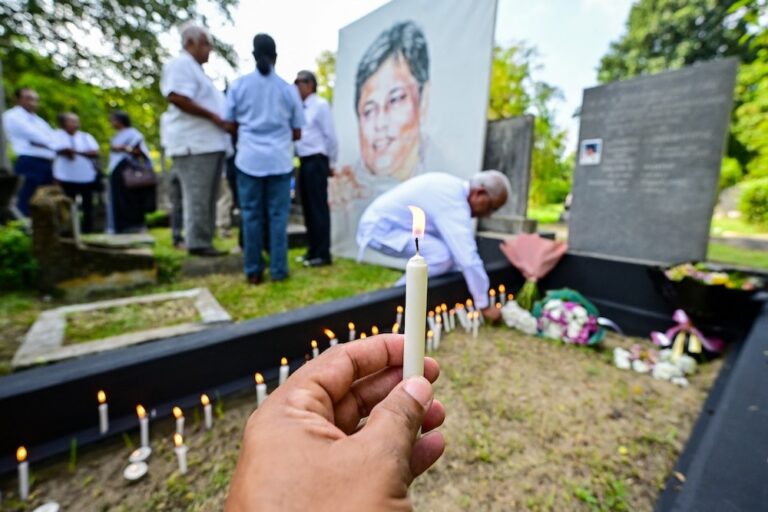(RSF/IFEX) – The following is an 18 October 2004 RSF press release: Family of journalist Mayilvaganam Nimalarajan demands justice, four years after his murder As his family marks the fourth anniversary of his death, Reporters Without Borders has urged President Chandrika Kumaratunga to revive the investigation into the murder of Tamil journalist Mayilvaganam Nimalarajan. The […]
(RSF/IFEX) – The following is an 18 October 2004 RSF press release:
Family of journalist Mayilvaganam Nimalarajan demands justice, four years after his murder
As his family marks the fourth anniversary of his death, Reporters Without Borders has urged President Chandrika Kumaratunga to revive the investigation into the murder of Tamil journalist Mayilvaganam Nimalarajan.
The BBC World Service correspondent was killed at his Jaffna home on 19 October 2000. After good progress was made in 2002, both the investigation and legal procedures have since stalled. Several suspects have also been released on bail and another suspect has reportedly managed to flee the country.
Reporters Without Borders criticised the Sri Lankan government’s failure to reopen the murder investigation and regretted that the journalist’s killers have not been tried or punished. The organisation called on President Chandrika Kumaratunga to ensure that justice is served in the case, as she herself demanded at the time of the murder.
Nimalarajan’s family, now living in exile, has launched an appeal to the government. The journalist’s father told Reporters Without Borders, “Four years after the murder of Nimalarajan, a courageous journalist who was sensitive to his community’s problems, we are sad to know that his killers have still not been tried. His memory lives on and his family is still traumatised by what happened in Jaffna. (. . .) Every indication we have is that the pro-government Tamil party [Eelam People’s Democratic Party] is implicated in his murder. Why has the investigation stalled? The holding of a trial would be a huge relief to our family.”
The Jaffna-based judge in charge of the investigation, R. T. Vignarajah, has received no instructions from the Office of the Attorney General, even though the final Criminal Investigation Department (CID) report was presented in April 2004.
The CID has never succeeded in questioning one of the suspects, Sebastianpillai Ramesh, better known as “Napoleon”. In addition, the police investigation does not appear to have considered the cartridge cases from a 9-mm gun and the remains of a grenade found at the scene of the crime. Prints found on a bicycle left by the journalist’s killers near his home have never been analysed.
Finally, four other suspects, all EPDP members, were freed on bail by a court in Vavuniya, northern Sri Lanka. They also obtained the right to report regularly to the police in Vavuniya rather than in Jaffna.


